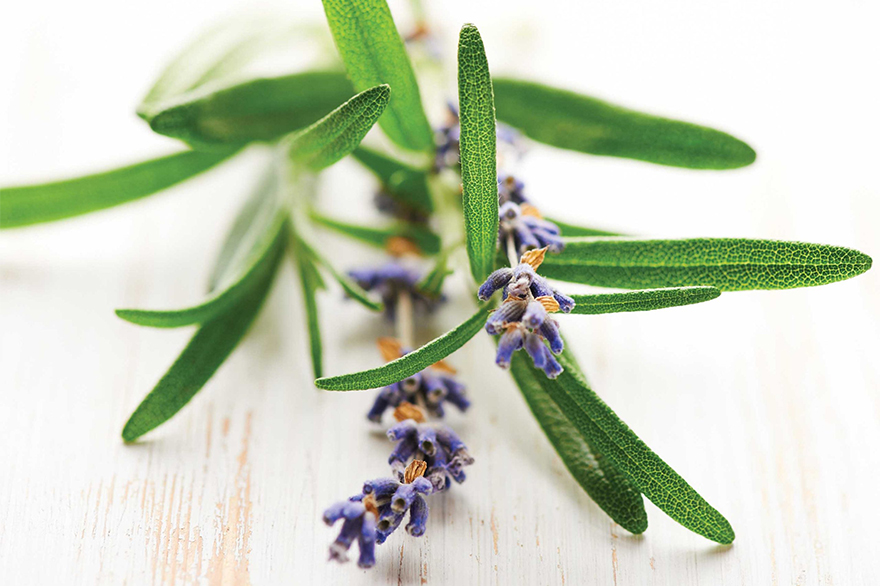Rosemary Essential Oil
The aromatic evergreen shrub with the needle-like leaves and tiny blue flowers that takes its name from the Latin rosmarinus, for “sea dew,” is a centuries old healing herb with many compelling properties. Although native to the Mediterranean region, rosemary is now found in many parts of the world where it thrives in a sunny and warm climate. Rosemary is a member of the mint family, a relative to basil, sage, lavender, and myrtle.
An Enduring History
The Romans revered the rosemary plant as sacred, using it in ceremonies, cosmetics, medicines, and food preparation. Ancient Egyptians used the plant and its extract as incense. 16th century famed German-Swiss physician and botanist Paracelsus believed that rosemary oil acted as a potent tonic, strengthening the entire body and possessing the capacity to heal the heart, liver, and brain.
The leaves, twigs, and flowers of the rosemary plant are used for culinary and medicinal purposes. The essential oil is mostly extracted from the leaves and the fresh flowering tops by steam distillation.
Rosemary Benefits Skin
When applied to the skin, this fragrant herb supports the circulatory system by:
- Easing congestion
- Reducing puffiness
- Decreasing swelling
- Improving blood flow
Thanks to its antiseptic and antimicrobial properties, rosemary essential oil is an effective treatment for oily skin, acne, eczema, and dermatitis. Massaging the scalp with rosemary oil removes dandruff and stimulates hair regrowth in people with alopecia. By stimulating the hair follicles, rosemary encourages longer and healthier hair while slowing premature graying.
Used as topical massage oil, rosemary helps treat muscle pain and spasms, headaches, rheumatism, and arthritis. The anti-inflammatory qualities can reduce pain and swelling from sprains and joint aches. Rosemary helps wounds heal faster by facilitating blood coagulation.
Rosemary Enhances Well-Being
Several studies point to rosemary’s effectiveness in treating emotional and cognitive conditions.
1) Anxiety
A 2009 study published in Holistic Nursing Practice showed that nursing students who inhaled rosemary and lavender essential oils experienced reduced anxiety when taking tests.
2) Stress
Inhaling rosemary essential oil for just five minutes decreased levels of the stress response hormone cortisol in healthy individuals, according to a 2007 study published in Psychiatry Research.
3) Cognition
Research strongly indicates that rosemary essential oil improves brain function. A 2003 study published in the International Journal of Neuroscience showed that 144 volunteers exposed to the odor of rosemary oil while taking a test enjoyed improvements in both cognitive performance and mood. For this reason, aromatherapy using rosemary essential oil may enhance cognitive function and slow disease progression in Alzheimer’s patients.
4) Immune System
The antioxidant properties of rosemary essential oil help boost the strength of the immune system, preventing diseases associated with free radicals, including heart disease and cancer. An aromatherapy massage with rosemary oil increased the scavenging free radical activity in the bodies of one study’s participants.
Rosemary essential oil is an instant mood booster and spirit lifter. In addition to all of the powerful therapeutic benefits this fragrant little herb brings to your skin, the next time you run low on energy or feel mentally fatigued, remember that just five minutes spent inhaling rosemary essential oil can turn your whole day around.
For more information on rosemary oil for hair loss, visit: www.hairlossrevolution.com/rosemary-oil

